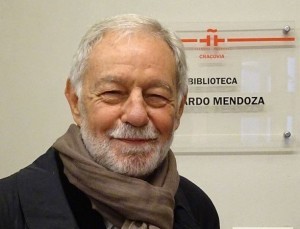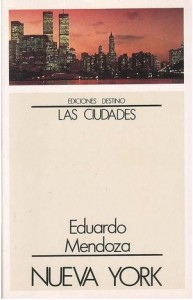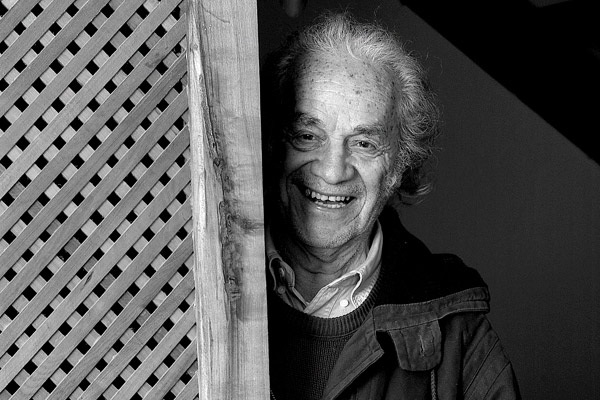Nicanor Parra (1914 – 2018)
Nicanor Parra Sandoval, creador de la antipoesía, falleció a los 103 años, tras una vida de reconocimientos entre los cuales se cuentan el Premio Nacional de Literatura en 1969, el Premio Iberoamericano de Poesía Pablo Neruda en 2012, el Premio Juan Rulfo en 1991, el Reina Sofía en 2001 y el Premio Cervantes, en 2011, máximo galardón de la literatura en lengua hispana.
El mayor del clan Parra, nacido en San Fabián de Alinco en 1914 y criado en el seno de una familia campesina, publicó su primer libro a la edad de 21 años, en 1935: “Cancionero sin nombre”.
Aunque estudió matemáticas y física, fue su búsqueda y experimentación literaria la que lo hizo conocido por su estilo único y rupturista. Fue en 1954 con la publicación de «Poemas y Antipoemas» que presentó la propuesta literaria que lo caracterizó y lo llevó a desarrollar un legado que fue reconocido con los premios literarios y distinciones más relevantes.
En nuestra biblioteca hemos realizado una exposición bibliográfica que puede visitarse hasta el 20 de febrero. Accede aquí a la bibliografía
Visita el sitio de la Biblioteca Nacional de Chile
Nicanor Parra Sandoval, creator of the «anti-poetry», died at the age of 103, after a lifetime of recognitions including the National Literature Prize in 1969, the Pablo Neruda Ibero-American Poetry Prize in 2012, the Juan Rulfo Prize in 1991, the Reina Sofía in 2001 and the Cervantes Prize, in 2011, the highest award for literature in the Spanish language.
The oldest of the Parra clan, born in San Fabián de Alinco in 1914 and raised in a peasant family, published his first book at the age of 21, in 1935: «Cancionero sin nombre».
Although he studied mathematics and physics, it was his search and literary experimentation that made him known for his unique and disruptive style. It was in 1954 with the publication of «Poemas y Antipoemas» that he presented the literary proposal that characterized him and led him to develop a legacy that was recognized with the most important literary prizes and distinctions.
Eduardo Mendoza ‘Premio Cervantes 2016’
 Eduardo Mendoza (Barcelona, 1943 -) novelista, autor teatral, abogado y traductor, ha obtenido el Premio Cervantes 2016. Considerado como el Nobel en lengua castellana, el galardón reconoce la trayectoria de un escritor que, con en el conjunto de su obra, haya contribuido a enriquecer el legado literario hispano.
Eduardo Mendoza (Barcelona, 1943 -) novelista, autor teatral, abogado y traductor, ha obtenido el Premio Cervantes 2016. Considerado como el Nobel en lengua castellana, el galardón reconoce la trayectoria de un escritor que, con en el conjunto de su obra, haya contribuido a enriquecer el legado literario hispano.
Eduardo Mendoza residió en Nueva York desde 1973 hasta 1982 donde trabajó como traductor en la ONU. Durante su estancia en Nueva York debuta con La verdad sobre el caso Savolta (1975) obteniendo el Premio de la Crítica en 1976, que junto con El misterio de la cripta embrujada (1979) se llevó a la gran pantalla.
Autor de 15 novelas, dos libros de relatos, dos obras de teatro, cuatro ensayos y un gran número de traducciones, ha recibido otros importantes premios entre los que destacan: el Premio de la Crítica, el premio Grinzane Cavour en Italia, el Premio Ciutat de Barcelona, el Premio Literario Elle, el Premio al Mejor Libro Extranjero en Francia, el Premio Planeta, la Nominación de Libro del año en Francia (Lire), etc.
Algunas novelas suyas han sido llevadas a la gran pantalla como La verdad sobre el caso Savolta por Antonio Drove, El misterio de la cripta embrujada por Cayetano del Real, Los soldados de plomo, por José Sacristán, La ciudad de los prodigios por Mario Camus o El año del diluvio por Jaime Chávarri.
En nuestra biblioteca puedes consultar y tomar en préstamo todos sus libros y las películas basadas en ellos. Consulta el catálogo.
La Biblioteca Eduardo Mendoza del Instituto Cervantes de Cracovia lleva el nombre del escritor desde 2011.
 Eduardo Mendoza (Barcelona, 1943 -) novelist, theater author, lawyer and translator, has won the Cervantes Prize 2016. Considered as the Nobel in Spanish, the award recognizes the career of a writer who has contributed to enrich the Hispanic literary legacy.
Eduardo Mendoza (Barcelona, 1943 -) novelist, theater author, lawyer and translator, has won the Cervantes Prize 2016. Considered as the Nobel in Spanish, the award recognizes the career of a writer who has contributed to enrich the Hispanic literary legacy.
Eduardo Mendoza, a law graduate, lived in New York from 1973 to 1982 where he worked as a translator at the UN. During his stay in New York he debuted with The Truth about the Savolta Case (1975) and won the Critics Prize in 1976, which, along with The Mystery of the Haunted Crypt (1979), was brought to the big screen.
Author of 15 novels, two books of stories, two plays and four essays, he has received other important prizes among which stand out: Prize of the Critic, the prize Grinzane Cavour in Italy, Prize Ciutat of Barcelona, Prize Literary Elle, the Best Foreign Book Award in France, the Planeta Prize, the Book Nomination of the Year in France (Lire), etc.
Some of his novels have been taken to the big screen as The truth about the Savolta case, by Antonio Drove, The mystery of the haunted crypt, by Cayetano del Real, The lead soldiers , by Jose Sacristán, The city of the prodigies, by Mario Camus or The year of the flood, by Jaime Chávarri.
In our library you can consult and borrow all of Mendoza’s books and the movies based on them. Search the catalog.
The Eduardo Mendoza Library of the Cervantes Institute of Krakow bears the name of the writer since 2011.
